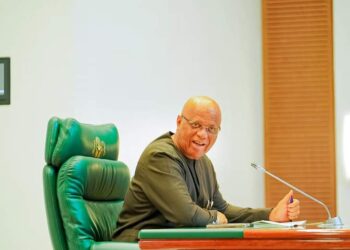The Capital Market Committee of the Securities and Exchange Committee (SEC), held its first meeting last week. In this interview with BENJAMIN UMUTEME, the Director-General of SEC, Lamido Yuguda, restated that protection of investors is at the heart of the Commission’s mandate.
In the course of your presentation, you mentioned that you will spare no efforts protecting investors, both minority and majority interest in companies that seem to be listed on the market. Could you just share with us from those efforts that we made to protect our interest?
Now, protection of investors is really the central mandate of the commission and when the commission protects investors, we do not discriminate between minority and majority shareholders. So when there is a case of de-listing, the application for de-listing comes to the commission and we go through it very carefully to ensure that the shares of the company being delisted are actually fairly valuable because fair valuation is what protects all investors, all the shareholders. So we ensure that this is really fairly valuable. If there are any issues, we actually take this application back to the issuing houses and get this sorted so that nobody that is in the company is actually treated unfairly. So, that is how the commission uses its regulatory power to ensure that both minority shareholders and majority shareholders are treated equally and fairly.
What is the update on unclaimed dividends?
Thank you very much for this question. I think we have answered the questions on unclaimed dividends severally. This is a figure that is dynamic, that is evolving. So at the moment, I will not give you a very specific figure, but I will let you know that there are arrangements that have actually been developed for managing the unclaimed dividends administration. You know that there is the unclaimed funds trust fund that has been established by government and unclaimed dividends are part of unclaimed funds that will be taken into this unclaimed fund trust fund, others are unclaimed deposits in bank, among others.
So there are efforts that are currently being made to ensure that this fund starts working. But the thing is that this fund is not taking over unclaimed dividends of people, if at any time anybody comes up with a claim for unclaimed dividends, the fund actually has been designed to pay that claim. But instead of allowing this fund to remain idle, this unclaimed fund trust fund is supposed to help in developing the country economically so that this will actually benefit both people who have this unclaimed dividend as well as other citizens who do not own them. Now I think these are the first two questions they are all on unclaimed dividends. If you want further details, we can actually engage with you to give you more specific details on these mechanisms that have been provided.
What is SEC doing on the crisis rocking Seplat currently?
We as a commission have issued a public statement on the engagements that we have had with both Seplat as a company and NGX, the exchange on which it is quoted and which is under our supervisory purview. And we have examined the issues surrounding Seplat, and we have come to the conclusion that these issues are not issues that really relate to the fundamental economic activity of Seplat as a corporate entity. The production of Seplat has not been affected. Work at all Seplat facilities is continuing as it should, but there are issues surrounding some of the members of the board and some of the shareholders. And we have urged the board to pay attention to these issues, both the administrative issues that have been raised and also the legal issues that have been raised. And at the moment, I will say that we are satisfied that Seplat is working in accordance with the agreements reached at that meeting to ensure that these issues are followed through by Seplat to a logical conclusion. We continue to receive updates from the board of Seplat about the current situation in the company and will continue to engage and to support the company to go through these issues fairly so that the interest of shareholders of Seplat is protected.
I am worried about the foreign portfolio that has been dropping over time. And in recent times, we have also seen that retail investors are reducing their participation in the market. So I am asking this afternoon, what are the ways that the SEC is planning on bringing both sets of investors, both foreign investors and retail investors in Nigeria, back into the market?
This is a very important question and it’s a question that talks to the attractiveness of both the capital market and also Nigeria as an investment destination. Now, the things that determine whether foreign investors come to a particular destination and whether retail investors who are domestic want to reinvest are similar but they are also quite different. When you have very good companies listed in the market like the Nigerian Capital Market. Companies that have good fundamentals, companies that are selling products, that have a ready market.
If you look at many of the companies on our market, they are actually doing very, very well even relative to other countries where they operate in. Now, if you are a domestic investor, clearly you have very little reasons not to participate in a market that is quite vibrant. And right now, if you look at the equity market in Nigeria, it is actually doing very, very well relative to many other jurisdictions. We closed 2022 very well and 2023 is looking also well, in spite of all, the challenges that we know exist in both the global economy as well as in the domestic economy.
Now for a foreign investor, no matter how attractive the domestic economy is, domestic capital market is, a foreign investor will always factor in the ability to transfer their domestic earnings into foreign exchange so that they can repatriate this foreign exchange to their countries. Now at the moment we all know that we are having some challenges with the foreign exchange situation in Nigeria. That is international investors who are invested, you know, reporting some delays in assessing foreign exchange for the repatriation of their dividends or their capital.
So because of this, you are seeing a reduced proportion of foreign investors in the Nigerian Capital Market relative to what this Market has been used to. That is a situation that is not permanent. We expect the foreign exchange situation in this country to substantially improve.
There are a lot of economic developments in the country today that actually are laying the foundation for a much more vibrant foreign exchange in the country. We do use a lot of our foreign exchange to import refined petroleum products. We know at the moment that the Dangote refinery in Lekki once it comes on stream, it will have the capacity of 650,000 barrels per day of refined petroleum products, lubricants, and the rest. So that means that a lot of the importation that is happening now should actually be sourced from this source and the amount of foreign exchange you are now wasting on importing refined petrol should substantially moderate if this huge refinery comes on board. It is actually very close to completion, so this is really a good thing.
Secondly, in terms of the other aspects, Nigerian economy really has a good potential to generate foreign exchange from a lot of non-oil sources. So once this is realized, you will see a much higher generation of foreign exchange in Nigeria. If you have a higher generation of foreign exchange from non-oil sources and reduced utilization of foreign exchange to import the refined petrol, you’ll find that these two, should give you a much better situation where you can now use, the greater availability for exchange to meet the needs of investors who are interested in really taking advantage of the economic opportunities existing in our country. So I think that is what I would say to that question. So it is not a situation that has no solution. The solutions are there, but right now this solution are actually in various stages of development. By the time they all come to full development, you will see that this situation should improve considerably.




